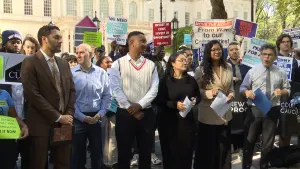More Stories
It was not that long ago that exotic furs, precious ivory and other products made from the slaughter of now-endangered and threatened animals were mainstream status symbols and sought-after luxuries. Now, conservationists and lawmakers are building awareness about a new law on World Wildlife Day. As wildlife conservation values have become enshrined in the law, those items are now banned in many parts of the world.
After an American trophy hunter tracked and killed an African lion named Cecil in Zimbabwe in 2015, touching off international controversy, state Sen. Bob Duff decided Connecticut needed a new law banning the sale of body parts from African elephants, giraffes, leopards, lions and rhinos.
Duff used World Wildlife Day Thursday to celebrate the passage of Cecil's Law.
"Connecticut values are, we don't want to have these animals here for trophy hunting. We don't want them in the state. We think that we should be protecting our environment, we should be protecting our wildlife and animals. We should be treating them with respect," said Duff.
Friends of Animals worked extensively with Senator Duff to craft the landmark legislation. “While this does not bring Cecil the lion back, it means his tragic death in 2015 was not in vain. His death made Connecticut lawmakers see the trophy hunting industry for what it is—morally bankrupt as well as economically useless in terms of conservation,” Priscilla Feral, president of Friends of Animals says. Friends of Animals is headquartered in Darien and supports conservation projects in Africa.
“We’ve worked for five years to deliver this setback to the trophy hunting industry and to help protect these magnificent ecosystem engineers. Killing is not conservation and we express our gratitude to state Senate Majority Leader Bob Duff and state Sen. Christine Cohen for their efforts to achieve this significant step to disincentivize trophy hunting because no one else could have shepherded this through the gauntlet of special interests. It’s been a Herculean task,” Feral says.
"The illegal trade of wildlife is the fourth largest organized crime in the world, so when they had legal trade of trophies here in Connecticut, that opens up an entire problem...a legal pathway for animal parts to get into the country. So the fact that we were able to get this law passed is something to celebrate on World Wild Life Day," said naturalist Mark Fowler, of the Grace Farms Foundation.
The Beardsley Zoo uses confiscated animal parts to help build awareness about their Species Survival Plan Program, designed to protect some of the most majestic creatures on earth.
The Beardsley Zoo says the confiscated goods are on permanent loan to them as a teaching tool from the U.S. Fish & Wildlife Service.
More from News 12
2:34

Guide: Safety tips to help prevent home burglaries
2:19

Guide: Safety measures to help prevent fires and how to escape one
2:40

Mayor's budget cuts: A controversial solution amidst immigration crisis
2:07

Tips on how to avoid confrontation with sharks while swimming in the ocean
2:33

5 tips to prevent mosquito bites and getting sick from viruses
2:39
